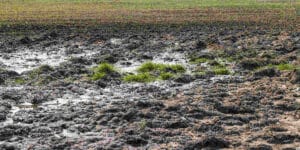By: Shelby McCullough| Published: March 13, 2023

When it comes to your garden, you may think that more water is better—plants need plenty of moisture, right? Unfortunately, it’s possible to have too much of a good thing! Excess water can cause all kinds of problems, from washing away nutrients to starving your plants and trees of the oxygen they need to grow.
If you’re struggling with oversaturated soil, follow these tips for keeping soil healthy from the experts at McCullough Tree Service.
What Causes Oversaturated Soil?
Causes of oversaturated soil include:
- Low spots in the yard that allow water to pool
- Irrigation systems that run on a schedule and over-water
- Gutters that drain into the yard
- Heavy clay soil that struggles to absorb water
How to Know if Your Soil is Oversaturated
Oversaturated soil has several telltale signs, such as:
- Plant leaves turning yellow and brown
- Plants that die and pull out of the soil easily, indicating root rot
- High volumes of water flowing quickly over the soil, which causes erosion
- Standing water pooling in certain parts of the yard
- Soil particles that clump easily when wet
Still not sure if your soil has saturation problems? Try this simple test:
- Dig a hole that’s 12 inches deep and 12 inches wide.
- Fill the hole with water.
- Time how long it takes for the water to drain.
If the water drains in one hour or less, your soil has good drainage. If it takes three hours to one full day, soil drainage is fair but could improve. If water stands for more than a day, drainage is poor, which means you’ll need to take corrective action to keep your plants healthy.
Correcting Oversaturated Soil
Wet conditions can be a nuisance, especially if your soil tends to retain moisture for too long. Luckily, you don’t need to spend a fortune to fix bad drainage.
Organic material, such as grass clippings and leaves, will do a great job at breaking up compacted soil particles and allowing water to flow through. Mix organic matter into the soil thoroughly and layer it around plants as mulch.
You may also want to consider installing a drain system that carries excess moisture away from plants.
Soil grading is another solution, but keep in mind that it can be a bit pricey. Grading changes the slope of your yard to direct water where it’s less harmful to plants.
If you use sprinklers, only run them when your plants look thirsty. Irrigating on a fixed schedule can cause bad drainage if it’s more water than plants need.
Working Around Oversaturated Soil
To work around poor drainage, try placing plants in raised areas where water doesn’t tend to pool. You can also choose plants, trees, and shrubs that thrive in wet conditions, such as:
- Primrose
- Japanese iris
- Daylilies
- Weeping willow
- Blue elderberry
- Red twig dogwood
- White cedar
- Oriental arborvitae
Let McCullough Tree Service Improve Your Soil
If your yard suffers from oversaturated soil and you need a helping hand with soil preparation for tree planting in Casselberry or nearby cities, contact McCullough Tree Service today by calling (407) 734-5854! Our Certified Arborists are available to answer all your questions about soil health, proper drainage, and much more.

